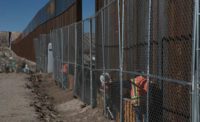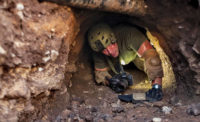If Donald Trump is looking for practical advice on how to fulfil his controversial pledge to build a wall along the U.S.-Mexico border, he may want to ask Turkey for help.
Facing increasing spillover from the war in neighboring Syria, Bulent Arınç, Turkey's deputy prime minister, announced in July 2015 that the NATO member state would build a wall along its entire border with Syria. Sections already existed in some areas, but this plan would cover the entire 911-kilometer border. Work is entering the final stages, with roughly two-thirds of the projected completed.
The majority of the wall is being constructed from prefabricated concrete blocks, weighing between seven and eight tonnes. Each block is 30 centimeters thick, 2 meters wide and 3 m tall, according to TOKI, the Turkish government's construction agency, which has been jointly developing the project with the Defense Ministry. The agency said the wall is being topped with 1 m of razor wire.
The wall is intended to prevent refugees, smugglers, ISIS members and Kurdish militias from crossing Turkey's border. The wall will be dotted with watchtowers, equipped with thermal cameras at varying intervals and feature steel gates at certain crossing points. On the Turkish side of the wall, security road is being constructed for patrol vehicles. According to the Turkish military, the Turkish defense company Aselsan is making the unmanned dirigibles that will patrol the wall. The camera-equipped UAVs will be able to hover at altitudes of up to 1,000 m to provide real-time imagery to the Turkish military.
The first sections of the wall, totaling about 200 km in length, were put in place by the Turkish armed forces in conjunction with local governors in the six provinces that span the border. The second phase of construction has been taken over by TOKI in partnership with private firms.
The agency's director, Ergün Turan, in September 2016 told the Turkish newspaper Hürriyet that, before being delivered by truck, 200 to 250 concrete blocks per day were being produced at five sites along the border.
Describing the work as "extremely arduous," he said TOKI has to build the access road at the same time as it is constructing the wall. He added, "It is not an easy task. We are working in an area covered with mines." In March, the Turkish armed forces said that, so far, they had worked to clear 415 landmines and improvised explosive devices from a 41,197-sq-m area. Winter weather also has presented challenges. Further, there have been periodic protests on both the Turkish and Syrian sides of the border.
Not all of the crossing will be protected by a concrete wall. Turkey Defense Minister Fikri Işık has said that 85 km of the border is interrupted by rivers—including the Tigris and the Euphrates—where unspecified "other measures" are being put in place.
In Hatay province, which abuts the Mediterranean Sea, the border runs through forested mountains. According to Ahmet Ertürk, of the Turkish defense firm Alp Çelik, the company's so-called Accordion Barrier System was used along a 95-km stretch of this rough terrain. A double layer of the company's five-cell system was installed along the route by Turkish army troops. Wire cages are lined with polypropylene cloth and then filled with rocks, debris, sand, gravel or soil. With excavation prepared in advance, the method is speedy, according to Ertürk. "With two staff, 200 meters of wall can be easily installed in an hour," he said. "The most important detail is the filling process. If excavation is ready, the filling process takes a very short time."
The same product has been used as a temporary measure in places where concrete blocks have yet to be installed.
The border-wall project has faced multiple delays. In September 2016, officials told Reuters the wall would be finished by the end of February 2017. On April 11, the Turkish military said that 556 km of concrete wall has been completed, with work accelerating as the weather warms. Turkish media have reported that the final bill for the wall and the patrol road will be approximately 2 billion Turkish lira (roughly USD$540 million).









